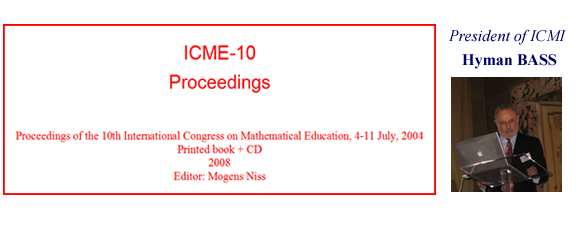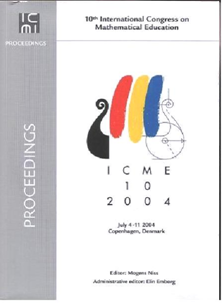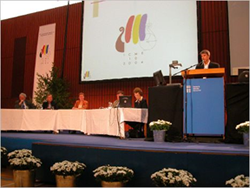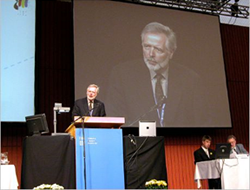 The website is in construction. New files will be uploaded as soon as they are available.
The website is in construction. New files will be uploaded as soon as they are available.
ICME-10
 |
Contents
8 Preface
10 Around ICME-10
17 Opening Session
Plenary sessions
42 P 1: Hyman Bass: Mathematics, mathematicians, and mathematics education
56 P 2: Panel moderated by Stephen Lerman: Mathematics education for whom and why? The balance between mathematics education for all and for high level mathematics performance
76 P 3: Anna Sfard on behalf of Survey Team 1: What could be more practical than good research? On mutual relations between research and practice of mathematics education
93 P 4: Erno Lehtinen: Mathematics education and learning sciences
105 P 5: Plenary Interview Session moderated by Michéle Artigue
123 P 6: Jill Adler and Survey Team 3: Mirror images of an emerging field: Researching mathematics teacher education
140 P 7: Andreas Dress: Structure formation in nature as a topic of mathematics
158 P 8: Ferdinando Arzarello: Mathematical landscapes and their inhabitants: Perceptions, languages, theories
Sub-plenary lectures
182 Maria Alessandra Mariotti on behalf of Survey Team 2: Reasoning, proof and proving in mathematics education
205 Christine Keitel on behalf of Survey Team 4: The shaping of mathematics education through testing
228 Frederick K.S. Leung on behalf of Survey Team 5: Information and communication technology in mathematics education
244 Guy Brousseau, Felix Klein Medallist: Research in mathematics education
255 Celia Hoyles, Hans Freudenthal Medallist: Reflections and transformations: A mathematical autobiography
Thematic Afternoon
266 TA A: Teachers of mathematics: Recruitment and retention, professional development and identity
271 TA B: Mathematics education in society and culture
276 TA C: Mathematics and mathematics education
281 TA D: Technology in mathematics education
287 TA E: Perspectives on research in mathematics education from other disciplines
Topic Study Groups
293 TSG 1: New development and trends in mathematics education at pre-school and primary level
298 TSG 2: New developments and trends in mathematics education at secondary level
303 TSG 3: New developments and trends in mathematics education at tertiary levels
307 TSG 4: Activities and programmes for gifted students
311 TSG 5: Activities and programmes for students with special needs
315 TSG 6: Adult and lifelong mathematics education
319 TSG 7: Mathematics education in and for work
323 TSG 8: Research and development in the teaching and learning of number and arithmetic
327 TSG 9: Research and development in the teaching and learning of algebra
331 TSG 10: Research and development in the teaching and learning of geometry
337 TSG 11: Research and development in the teaching and learning of probability and statistics
341 TSG 12: Research and development in the teaching and learning of calculus
346 TSG 13: Research and development in the teaching and learning of advanced mathematical topics
351 TSG 14: Innovative approaches to the teaching of mathematics
355 TSG 15: The role and the use of technology in the teaching and learning of mathematics
359 TSG 16: Visualisation in the teaching and learning of mathematics
363 TSG 17: The role of the history of mathematics in mathematics education
368 TSG 18: Problem solving in mathematics education
373 TSG 19: Reasoning, proof and proving in mathematics education
377 TSG 20: Mathematical applications and modelling in the teaching and learning of mathematics
382 TSG 21: Relations between mathematics and other subjects of science or art
388 TSG 22: Learning and cognition in mathematics: Students' formation of mathematical conceptions, notions, strategies, and beliefs
394 TSG 23: Education, professional life and development of mathematics teachers
399 TSG 24: Students' motivation and attitudes towards mathematics and its study
402 TSG 25: Language and communication in the mathematics classroom
407 TSG 26: Gender and mathematics education
412 TSG 27: Research and development in assessment and testing in mathematics education
417 TSG 28: New trends in mathematics education as a discipline
422 TSG 29: The history of the teaching and the learning of mathematics
Discussion Groups
426 DG 1: Issues, movements, and processes in mathematics education reform
429 DG 2: The relationship between research and practice in mathematics education
433 DG 3: Mathematics education for whom and why? The balance between "mathematics education for all" and "for high level mathematical activity"
438 DG 4: Philosophy of mathematics education
443 DG 5: International cooperation in mathematics education: Promises and challenges
448 DG 6: The education of mathematics teachers
454 DG 7: Public understanding of mathematics and mathematics education
457 DG 8: Quality and relevance in mathematics education research
461 DG 9: Formation of researchers in mathematics education
465 DG 10: Different perspectives, positions, and approaches in mathematics education research
470 DG 11: International comparisons in mathematics education
475 DG 12: Assessment and testing shaping education, for better and for worse
480 DG 13: Evaluation of teachers, curricula and systems
485 DG 14: Focus on the development and research of mathematics textbooks
490 DG 15: Ethnomathematics
495 DG 16: The role of mathematical competitions in mathematics education
498 DG 17: Current problems and challenges in pre-school mathematics education
504 DG 18: Current problems and challenges in primary mathematics education
509 DG 19: Current problems and challenges in lower secondary mathematics education
514 DG 20: Current problems and challenges in upper secondary mathematics education
519 DG 21: Current problems and challenges in non-university tertiary mathematics education
524 DG 22: Current problems and challenges in university mathematics education
529 DG 23: Current problems and challenges concerning students with special needs
534 DG 24: Current problems and challenges in distance teaching and learning
538 Closing Session
558 List of sponsors
Notes

One volume, format about 24 cm x 17 cm; 560 pages and a CD. The CD has all the contents of the volume, and also includes the 64 papers based on the Regular Lectures (of which there were 74).
Photo gallery

Morten Blomhoj, Chair of the Local Organizing Committee

Bernard Hodgson, Secretary General of ICMI
